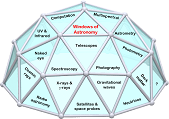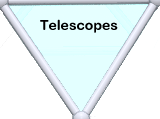Windows of Astronomy |
|
The naked eyeWhat can you do with the naked eye? When it comes to the stars and planets, not a lot. The eye can observe the stars twinkling, a bit like the flames in a fire seen from afar. It’s natural to infer something is burning and, feeling no heat, that they are a long way away. They are far away but they are not burning, as we now know. Indeed, would that we could reproduce on Earth their means of generating energy continuously. The Sun, Moon and five ‘stars’ move relative to the rest, so they are probably nearer. The Sun certainly influences the Earth on a daily basis; the other wanderers were assumed to as well. Another wrong assumption, except for the Moon, but that not in the way imagined before the 17th century. The pattern of the wanderers against the backdrop of ‘fixed stars’ could be measured approximately, the time for the wanderers to go around the sky determined. This much astronomy was pretty well only a handmaiden to astrology. Eclipses were seen intermittently, interrupting the daily regularity. It's easy to see that the stars are not equally bright and a sharp eye notices that a few change their brightness but such detail was seldom mentioned. The fixed stars provided some assistance with navigation but only as a consequence of their positions and visibility. To make matters even worse, we live at the bottom of a deep ocean of air that distorts starlight, bends it, absorbs some of it and for half the time so dazzles us with scattered sunlight that we can't see either stars or planets.
|
 Looking at Mercury. Image by Sophie Desrosiers Looking at Mercury. Image by Sophie Desrosiers |

